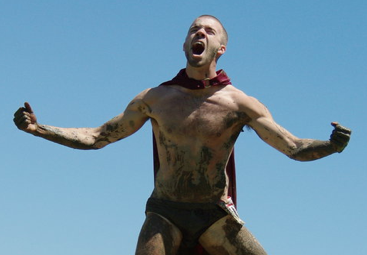Finance Drones Seek Manly Spartan Adventures

It was a close thing, but in a demurely tasteful ceremony this weekend, the nation’s honor was restored. Now, however, comes the hard part: Like the other cardinal virtues, honor requires extreme vigilance, cautious oversight and constant care and feeding to sustain. How can we strengthen our collective moral fiber without succumbing to the telltale atrophy of mind, body and spirit?
As usual, the nation’s lords of finance are here to lead the way. In this moment of unique moral-cum-calisthenic peril, they are stepping forth as exemplars of the extreme adventure challenge.
As Teddy Wayne notes in Bloomberg BusinessWeek, the gladiatorial weekend competitions are “growing in popularity among young professionals, particularly those in finance.”
One such signature contest is the Spartan Race-we weren’t kidding when we said “gladiatorial.” It’s currently in the midst of a nine-city road tour across the United States, Canada, and the U.K.; its lead organizer, a former Canadian Royal Marine named Brit Richard Lee, estimates that 60 percent of the more than 15,000 enrolled participants are on corporate teams.
For a mere $50 to $70 entry fee, contestants leap through fire and crawl under barbed wire-and of course intone period war cries, like “prepare for glory!” and “Remember to return with your shield-or on it!”
Yeah, I’m not sure what that last one means, either-armaments tobogganing, so far as I know, was never featured in The Iliad. But it sure sounds menacing-and that, of course, is the point. If you hie over to the competition’s website, you’ll find that it drips with scorn for the cosseted fops who shun primal urges for phony over-civilized comfort. “In a bygone era barely imaginable by present day desk jockeys and gamer warriors,” it bellows, “adventure and toughness were part of everyday life. Modernity, in its quest for ever higher standards of safety and convenience, has made our lives soft and lackluster.”
This is, in fact, a lamentation as old as modernity itself. Teddy Roosevelt famously shed his sickly childhood pallor in favor of the hardy martial virtues of the strenuous life, becoming in the process America’s poster child for a particularly rugged sort of bourgeois self-improvement. As historian T.J. Jackson Lears notes, classically minded he-men like TR negotiated a significant shift in how American culture viewed suffering and physical trials. By the outset of the 20th century, Lears writes:
suffering was often less a means of character formation than another path to intense experience. As ethical frameworks softened, vitalism replaced stoicism. Action became its own reward; to pause was to risk falling prey to paralyzing self-doubts and anxieties.
The result, Lears observes, was a new “activist version of therapeutic self-absorption-a fascination with ‘risk-taking’ and ‘winning through intimidation’ as ends in themselves.”
Hence the rudderless, hortative rhetoric of Spartan Race’s promo copy, which seems lifted in equal parts from a Tony Robbins seminar and an XM Death Metal marathon. On the one hand, the race lists its principal requirement as “a desire to live!” and notes that the top three qualify to compete in the allied world champion “Death Race” in Pittsfield, Vt. On the other hand, the race offers standard-issue tchotchkes and picnic-outing diversions: Top finishers win either an “authentic Spartan helmet” or an “authentic Spartan spear” (which, at this late date, presumably means that each item was touched at some point by someone who once visited Sparta).
Onlookers, meanwhile, can have their “picture taken dressed as a Spartan” or take part in “Spartan face painting, spray on abs and tattoos.” Somehow, I don’t think spray-on abs quite comports with the Rough Rider’s vision of the strenuous life.
Nevertheless, Spartan Race is clearly at the center of a booming market. There’s the Warrior Dash competition, which, as Wayne notes, graces participants with “a horned ‘warrior helmet’ reminiscent of Hagar the Horrible’s.” Across the pond, we have the British Tough Guy Race-and a couple of stateside mud-themed contests, Tough Mudder and Muddy Buddy, for when the classical virtues seem, I dunno, a little too chi-chi. Any theme will do, it seems, so long as it promises therapeutic self-absorption and arduous self-dramatization. “Corporate life, and life as we know it today, is very comfortable,” says Brian Duncanson’s Spartan Race’s remorselessly on-message CEO. “People may think they have it hard, but it’s nothing compared to how hard it used to be.”
But there’s hard, and you know, hard. Sure, Death Race contestants have to eat a pound of onions each way as they go up and come down a mountain. But classical notions of honor were more than simply military and, well, gross-they also involved individual responsibility and the brand of practical, contextual wisdom that Aristotle called phronesis.
So in that spirit, I’d like to propose a new kind of extreme adventure for today’s financial and executive class. Let them forsake the Vermont mountains and see if they can’t manage to attract small-business investment back to the inner city neighborhoods decimated by the adjustable rate mortgages that today’s swashbuckling financiers marketed so heedlessly at the height of the bubble. Let them lay aside their authentic Spartan and horned Viking helmets for a bullhorn and a pile of leaflets to meet the challenge of trying to unionize a Walmart. (They’d better bring some lawyers in tow, as well, for the flood of harassment suits sure to follow.) Let them manage a school bond crisis or a federal mortgage cramdown, just once, in a manner that doesn’t redound to their benefit.
Any takers? Yeah, well, I thought not. Better to just polish your helmets, as it were, and take your due place along the other wussy gamers and desk jockeys.
Chris Lehmann’s book, “Rich People Things,” which is not at all a collection of these columns, is available now for pre-order! “Social criticism at its scorching-hot best,” says Barbara Ehrenreich!
